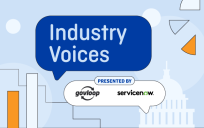![]()
The National Governor’s Association Winter Meeting just ended Sunday, and as I watched the news from that conference, I was reminded how important it is to share data and ideas. It’s this data and idea sharing that helps transform how local government agencies are addressing needs across our communities.
Issues like disaster recovery and the opioid epidemic are typically discussed at a national level, but it is our communities that are on the front line of these crises. Mitigation, response, and recovery efforts originate at the community level. And with a renewed focus on which issues should be tackled at the federal level, and which should be handled by the states, conferences like the National Governor’s Association meeting really take on greater meaning, and become more of a working group for the sharing of tips and best practices.
As conditions shift – okay, as new administrations come into power – familiar policies and standards become obsolete. Communities need to better understand conditions and adopt policies and procedures that reflect their ‘new normal.’ They need new ways to keep citizens safe and businesses operating. Only through understanding the risks communities face can proactive policies be developed and implemented that will increase their long-term resilience to anything that comes their way.
How can our communities work together so we don’t reinvent the wheel, and share our expertise to make the most of what we have experienced? I have three things I keep in mind when I talk to my colleagues:
- Find a framework that works: It’s important to use a framework that allows data to be explored in context, discover patterns, generate information and test scenarios. We should be engaging with systems that can perform complex simulation and modeling, not just using applications that only collect and display data. The data’s in the details, I like to say; and by this I mean that the real value of any data are the insights derived. Just telling me what it is isn’t as impactful as being able to tell me why it is, and why that matters.
- Don’t judge – compare: How can you really understand how your community is doing? By looking at communities like your own. Until recently however, it’s been difficult to see how green the grass is in another city because data is collected differently, with no constant, making comparison problematic. An interesting example I like to share is the Urban Observatory an interactive exhibit that provides a place to compare and contrast maps of cities from around the world. After all, the point is not to win a contest, the point is to learn from each other – see what pain points your neighbors are experiencing and whether or not they align with your own.
- Capitalize on resources – The best thing about the Internet is the ease with which we can share apps, simplifying the creation process when devising solutions for our challenges. Online portals make it easy to find code, data and ready built solutions, and the best thing is that anyone can tap into these portals – citizens, government staff, and business people. Hackathons are another great way to explore options, too. Listen, I already ask my five year old to program my DVR, can you imagine the powerful solutions that can be created in a room of young professionals let loose with some data and software, an idea, and limitless snacks? It’s pretty powerful.
For our friends in state and local government, this is a tipping point – a chance to grab the reins and steer their own course forward. Creating a community, like the National Governor’s Association, and encouraging collaboration brings forth the best ideas of those on the front lines and allows everyone to benefit. And, as communities continue to work to find solutions to thorny issues, sharing knowledge and experiences will become more important than ever.
Christian Carlson is part of the GovLoop Featured Blogger program, where we feature blog posts by government voices from all across the country (and world!). To see more Featured Blogger posts, click here.





Leave a Reply
You must be logged in to post a comment.